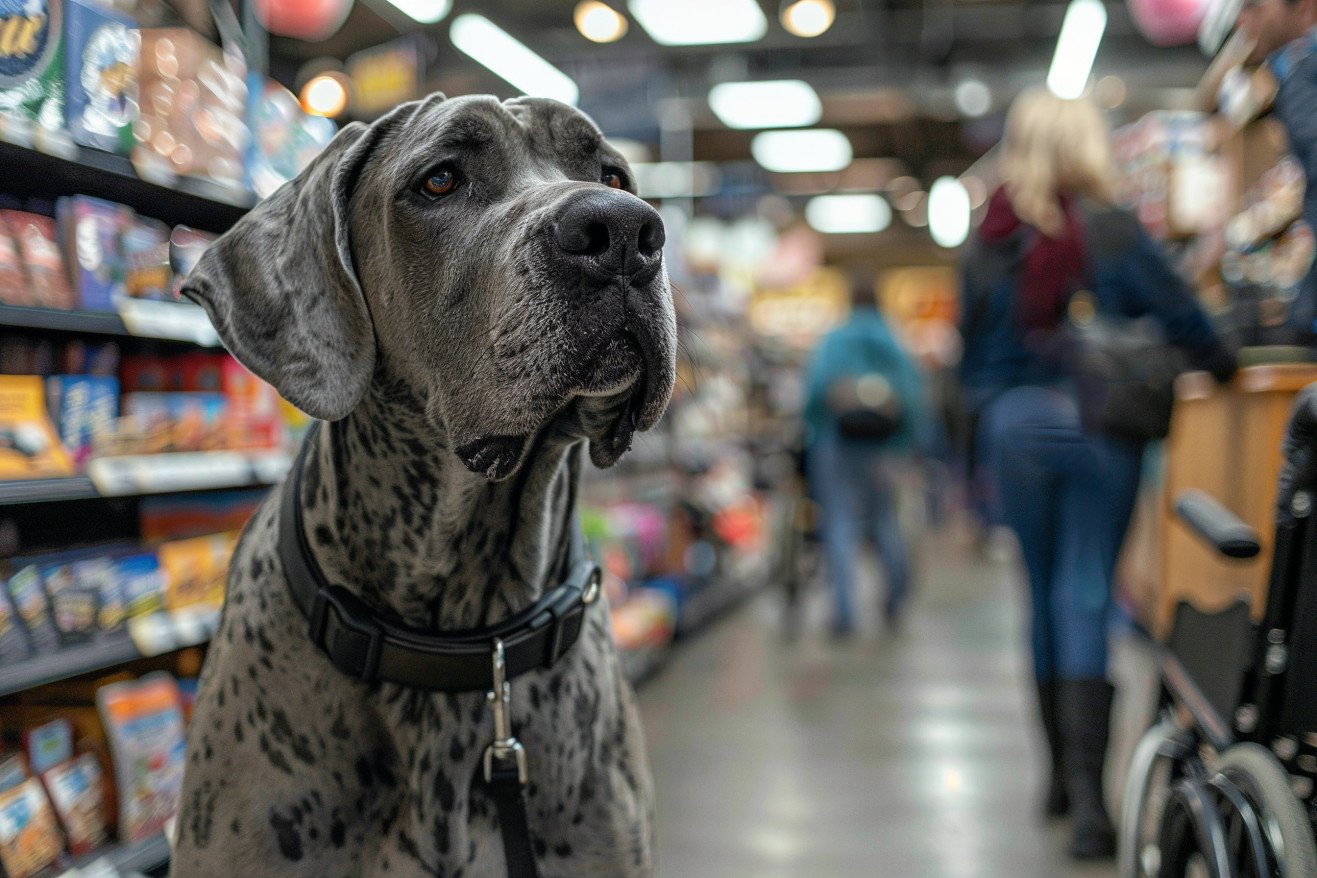Can You Take Your Dog to Michaels? A Look at Their Pet Policy
24 April 2024 • Updated 24 April 2024

If you’re thinking about taking your dog with you on your next trip to the craft store, you may be wondering, can you take your dog to Michaels? While the pet policy may vary by location, dogs are generally not allowed in Michaels stores unless they are service animals. This is in line with the company’s goal of maintaining a safe and clean shopping environment for customers and is consistent with the standard retail practice of not allowing pets in stores that sell food or household items.
In this article, we’ll take a closer look at Michaels' pet policy, including why animals are restricted from certain businesses and the laws that govern this practice. We’ll also offer advice for pet parents who want to take their dogs out on a shopping excursion while ensuring their needs are met. With this information, you’ll be better prepared and less likely to encounter any issues when you visit craft stores like Michaels.
Are dogs allowed in Michaels?
Understanding the Laws and Regulations
The Americans with Disabilities Act (ADA) is an important piece of legislation that protects the rights of people with disabilities, including those who use service animals. According to the ADA, service animals are dogs that are "individually trained to do work or perform tasks for people with disabilities." This is different from emotional support animals (ESAs), which are there for emotional support and are not trained to do work that helps with a person's disability.
It's worth noting that while the ADA protects the use of service animals, emotional support animals are not given the same legal protections. This is why companies like Michaels are able to ban all non-service animals from their stores. There are also some state and local laws that may come into play, so companies should be sure to understand the laws in their specific area.
In terms of service animals in public places, it's important to remember that these animals are there to work. As the ADA guidance states, the public should not pet, feed, or otherwise disrupt service animals as it may prevent them from being able to do their work. By knowing and following these laws and rules, we can make sure that everyone feels safe and welcome.
Why Retailers Are Embracing Pet-Friendly Policies
Retailers are increasingly adopting pet-friendly policies, and there are several good reasons why. According to The Conversation, one of those reasons is that allowing pets in stores can help meet customers' social needs for belonging and esteem. This is especially important for younger generations who are increasingly turning to online shopping due to its convenience but miss the social interaction of in-person shopping.
In addition to the social reasons, there are economic reasons for retailers to adopt pet-friendly policies. As the Better Cities For Pets report points out, 66% of U.S. households have a pet, and over 23 million households got a new pet during the COVID-19 pandemic. Many of these pet owners, especially millennials, are looking to include their pets in their daily lives, with 76% of millennials saying they're more likely to splurge on their pet than themselves.
In addition to these reasons, there are other business benefits to allowing pets in stores. For example, according to TimeWellScheduled, the top benefits of allowing dogs in stores include improved employee collaboration and the ability to attract top talent. In general, pet-friendly retail policies can help create a more welcoming and inclusive environment for both customers and employees.
How to Implement Pet-Friendly Policies: Best Practices
Retailers looking to implement pet-friendly policies can get started by creating a comprehensive pet policy. According to the Pets Welcome Toolkit, this includes steps like learning about local laws, making sure the community has the right pet infrastructure, and working with local government and community leaders.
It’s also important to establish clear pet-friendly and pet-free zones within the store. As noted by DGP For Pets, it’s important for retailers to create designated pet zones to meet the needs of both pet owners and people who don’t want to be around animals. These zones can be outdoor areas, specific parts of the store, or other areas that are away from sensitive equipment or food prep.
To make the environment as welcoming as possible, retailers can also offer pet-friendly amenities like water bowls and waste stations. Workable's pet policy template also recommends that retailers think about adding a small pet play area if there’s enough space. Retailers can also make sure that they set clear expectations for pet owners, such as requiring that pets be on a leash and that owners provide proof of vaccinations.
Finally, it’s important to make sure that the pet policy is clearly communicated and that employees are trained on it. This will help make sure that all employees are on the same page and that they know how to handle any pet-related issues that arise. By following these best practices, retailers can create a pet-friendly environment that meets the needs of both customers and their furry friends.
Customer Experiences and Feedback
Per Stores That Allow Dogs | Your Guide to Dog-Friendly Stores in America, Michaels Stores is one of the many national chains that allows dogs in all of its stores. The policy at Michaels is that they allow dogs in all their stores, as long as the dogs are well-behaved and properly restrained (e.g. on a leash). However, the article does not provide any specific details about Michaels' policy for service animals.
While the Rover.com article doesn’t include any customer stories about taking dogs into Michaels stores, it’s worth noting the importance of pet etiquette and responsible pet ownership. As mentioned by ASPCA Pet Health Insurance, pet owners should make sure their pets are well-behaved, leashed, and not disruptive or intrusive to other customers. Other suggestions for a good shopping experience include bringing cleaning supplies, keeping pets out of food areas, and being mindful of people with allergies or phobias.
These best practices can help ensure that Michaels is a welcoming place for all customers, whether they have pets with them or not. Finding a balance between being inclusive to pet owners and creating a safe and welcoming environment for all customers is important for the success of a pet-friendly policy.
Conclusion: Striking a Balance
In conclusion, Michaels' pet policy is an example of how retailers can strike a balance between meeting the needs of pet owners and ensuring a safe and comfortable environment for all customers. Although Michaels' general policy is to prohibit dogs in its stores, it does make an exception for service animals as required by the Americans with Disabilities Act.
The advantages of pet-friendly retail policies are numerous, including increased sales and foot traffic and higher employee satisfaction. However, retailers must also take into account the needs of customers and employees who may be allergic to or uncomfortable around animals. By creating clear pet policies, establishing designated areas, and offering amenities, retailers can make sure that everyone feels welcome in their stores.
In the end, it's all about compromise and collaboration between retailers and pet owners. Pet owners need to make sure their pets are well-behaved and don't disrupt other customers. Meanwhile, retailers need to make sure their pet policies are clear and that their employees are well-trained to handle any issues that may arise as a result of customers bringing their pets into their stores.
By striking a balance, Michaels and other retailers can meet the demand for pet-friendly shopping while ensuring that their stores remain safe and comfortable for everyone.


